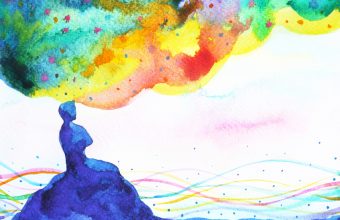Five years old. That’s how old I was when I began suffering from depression.
I was like a changeling. Before kindergarten, I was so outgoing that my parents legitimately worried I might be kidnapped. I would talk to anyone, go with anyone, do anything. I was fearless and friendly and full of life. Then, seemingly overnight, it all changed. I became withdrawn and fearful. I couldn’t handle conversations with strangers and I had extreme difficulty socializing with my peers. At school, I was quiet and reserved, my report cards reading that I was a “very sensitive child.” At home, I had emotional outbursts.
There was no trigger that we are aware of. Depression and anxiety can come out of nowhere, even to children with an idyllic home life and attentive, supportive parents. But this was 1985, when little was understood about depression at all, never mind in children, and we would not recognize that I was suffering from depression until I was nearly twenty.
It was my doctor who approached me about it when I was there on an unrelated visit. She recognized the signs in me and asked if I thought I might be experiencing depression. I had suspected so for a long time, and I burst into tears at finally feeling seen. I began receiving treatment for my anxiety and depression, and it has helped immensely. But being diagnosed after living with depression for nearly fifteen years – almost my entire childhood – meant that I missed the opportunity for early intervention that could have drastically changed the trajectory of my life.
I often mourn the years of my youth I lost to depression, and wonder where I would be if I had been given the tools to cope when I was young enough to make the lifestyle changes more easily.
Mental health struggles in children are not rare.
And they are so important to recognize. According to data from Mental Health T.O.:
- About 15% of children in Canada are affected by a mental illness or disorder but only 1 in 5 will get the help they need.
- 70% of childhood mental health issues can be solved with early intervention and therapy.
- Canada’s youth suicide rate is the 3rd highest in the world.
Children between ages seven and twelve are most at risk. As someone who lived through childhood depression and anxiety, this saddens me. And as the mother of a child who is exhibiting signs of anxiety and depression, it scares me. We know now how important early intervention is – but it can be hard to know where to start.
Mental Health T.O. Offers Kids & Parents a Starting Point
I was heartened to learn of the Mental Health T.O. program. A relatively new resource, Mental Health T.O. offers what so many parents of children with mental illness need – a starting point.
Children under the age of eighteen, or their guardians, can call to get information about resources, referrals to programs, and other valuable “go-tos.” Specifically, you can call to get information about:
- Mental health services in the caller’s neighbourhood or in other parts of the city
- Crisis lines
- Self-help groups
- Distress centres
- Family services
- Information and referral to other services
How do you know if your child might be experiencing difficulties with mental health?
It’s a great question without an easy answer. Of course, the best way to know for sure is to contact professionals for a proper assessment, but there are signs to watch for:
- Heightened emotions/mood swings
- Losing interest in things they once enjoyed
- Issues at school: conflict with teachers/peers, suspensions
- Behaviour changes or acting out: Increased isolation while home/isolation from friends and family
- Change in typical behaviour: thoughts, actions, eating, sleeping, etc.
If you recognize any of these tendencies in your child (or in yourself, if you are under eighteen and reading this) – there’s hope. It’s daunting, but with help, it gets better.
You can visit the Mental Health T.O. website at mentalhealthto.ca to find out more information on their services.
To access their resources, you can call them at 1-866-585-6486 from 9 am to 5 pm.
Tagged under: Toronto,mental health kids,mental health,mental health awareness






